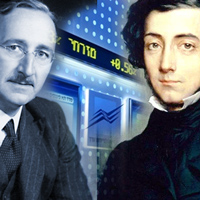In Israel, the United States, and all the democratic nations of the West, a great debate is unfolding about the nature of freedom. The declarations of independence in both America and Israel promise citizens personal liberties in a free nation. But what is the Western tradition of freedom that grounds those foundational promises, and what is the state of the Western tradition of liberty today?
In politics, the idea of freedom gave rise to modern democracy and representative government. Ancient freedom was the exercise of direct, unmediated political sovereignty. Compatible with this freedom was the complete subjection of the individual citizen to the common resolve of the polis. It took the discovery of individual rights, and philosophers and statesmen such as John Locke and James Madison, to conceive constitutional orders that protect rights, to elaborate a truly modern political freedom. The institutions of liberal political freedom gave the modern state its form, but it relied on goods such as family, religion, tradition, and the private associations of civil society to sustain it. The challenge for liberal political freedom remains how to secure the procedural framework of rights while continuing to nourish the social goods and civic values necessary for a civilized society.
In economics, the idea of freedom gave rise to the market economy, through which millions have been lifted from subsistence penury into the middle class. At its best, the market economy encourages producers of wealth to think of providing for themselves and their children; it encourages the bourgeois virtues of industry and self-reliance, and it unleashes the powers of human creativity to improve the human condition. But the free economy can also nurse avarice, greed, and narrow self-interest. Some defenders of the market economy have even acknowledged that the market’s public benefits are based on private vices. It has always fallen to political economists to harness the energies and virtues of the market economy and govern its vices.
Led by political theorist Peter Berkowitz of Stanford University and Israeli public intellectual and Mida editor Ran Baratz, this institute will explore the past, present, and future of the idea of freedom and the tradition of liberty. How does liberty contribute to prosperity and happiness? How does it relate to Judaism, and the unique character of the Jewish State? What threats—foreign and domestic—confront liberty in the Western nations, and what resources—spiritual, cultural, political, material—can the liberal democracies count on to preserve their founding promise?
This institute will take place at Beit Avi Chai in the heart of Jerusalem (King George 44).

